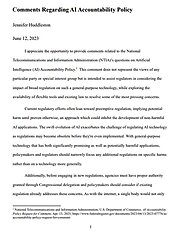Current regulatory efforts often lean toward preemptive regulation, implying potential harm until proven otherwise, an approach which could inhibit the development of non-harmful AI applications. The swift evolution of AI exacerbates the challenge of regulating AI technology as regulations may become obsolete before they’re even implemented. With general-purpose technology that has both significantly promising as well as potentially harmful applications, policymakers and regulators should narrowly focus any additional regulations on specific harms rather than on a technology more generally.
Additionally, before engaging in new regulations, agencies must have proper authority granted through Congressional delegation and policymakers should consider if existing regulation already addresses these concerns. As with the internet, a single body would not only be inadequate in regulating AI’s vast applications but could also gain unwarranted power to influence the industries. Given the general-purpose and malleable qualities of AI technology, this comment proposes adopting a “soft law” approach, favoring it over rigid regulations furthered by a single regulator.


